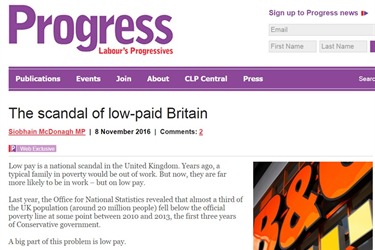 Following up from her recent parliamentary debate, Siobhain has written an article on low-pay in Britain in Progress magazine. You can read the article online here.
Following up from her recent parliamentary debate, Siobhain has written an article on low-pay in Britain in Progress magazine. You can read the article online here.
Low pay is a national scandal in the United Kingdom. Years ago, a typical family in poverty would be out of work. But now, they are far more likely to be in work – but on low pay.
Last year, the Office for National Statistics revealed that almost a third of the UK population (around 20 million people) fell below the official poverty line at some point between 2010 and 2013, the first three years of Conservative government.
A big part of this problem is low pay.
According to the Resolution Foundation, almost a quarter of UK workers earn less than the real living wage, the equivalent of £16,500 per year for a full time week outside of London, and £19,000 in London.
A staggering 1.5 million workers earn only the statutory minimum wage of £7.20 per hour – that is just £15,000 per year for a 40 hour week.
But for the wealthiest in our country, things have never been so good.
The High Pay Centre has shown that the UK’s top chief executives earned an average of £5.5m each last year. This means that chief executives enjoyed a 10 per cent pay rise last year – while wages for low-paid paid workers rose by just two per cent in the same period, according to the ONS.
On average, FTSE 100 chief executives now earn 129 times more than their employees, when you take into account pensions and bonuses.
In short, the link between productivity and remuneration is breaking. It should be common sense that those who make a company’s profits possible should receive a decent day’s pay.
Most obviously of all, they certainly should not be rewarded for their years of loyal service by receiving a pay cut.
But at dozens of high profile companies nationwide, that is exactly what is happening.
At B&Q, long serving staff lost entitlement to double time for Sundays and bank holidays. At Samworth Brothers, someone working nightshifts will now earn 30 per cent less per hour in 2019 than they do now, because double-time for nightshift work has been scrapped. M&S scrapped double-time entitlement to pre-2002 employees, and amended pensions – leaving thousands of staff thousands of pounds worse off. And now it looks like John Lewis Partnership will be making very similar changes.
What is most disappointing of all is the government’s refusal to recognise that this is even a problem. The prime minister is trying to rebrand the Conservative party as the party for working people – and yet, the government remains completely out of touch with low-paid Britain.
Last week, during a debate I held on the national living wage, I was extremely disappointed by the government’s refusal to recognise the plight of thousands of workers across the country who are losing out, as a result of loopholes which allow an increase to per hour pay, while a cut to total pay.
Instead the BEIS minister, Margot James, argued stated that ‘it is for employers to decide how to manage those increases in their costs’. This is a change of policy since April of this year, when former chancellor, George Osborne, stated that companies making such cuts to pay for the higher minimum wage were acting against ‘the spirit of the law’.
When confronted with M&S’s unscrupulous actions, the minister simply stated that M&S had been ‘maligned unfairly’.
Is this a government that is in touch with the situation of ordinary working people that we all represent?
If someone is promised a pay rise, they should receive a pay rise. There are employers that are using all loopholes possible in order not to do that – and we as politicians need to call it out.
The vote for Brexit was in part a cry from these ordinary working people that life is extraordinarily unfair; that no matter how hard they work, they cannot improve prospects for their families; that there is no connection between productivity and pay – in other words, that a fair day’s work does not get a fair day’s pay.
If we are to keep our country together, we need to ensure that that happens, and it will happen only if we do what we say and take on all those companies.
We need a government that takes seriously the plight of low-paid Britain. And it should be clearer now than ever that we desperately need Labour back in government, to prove that a society in which the poorest flourish is one where we all benefit.
———————————
Siobhain McDonagh is member of parliament for Mitcham and Morden. She tweets @Siobhain_MP